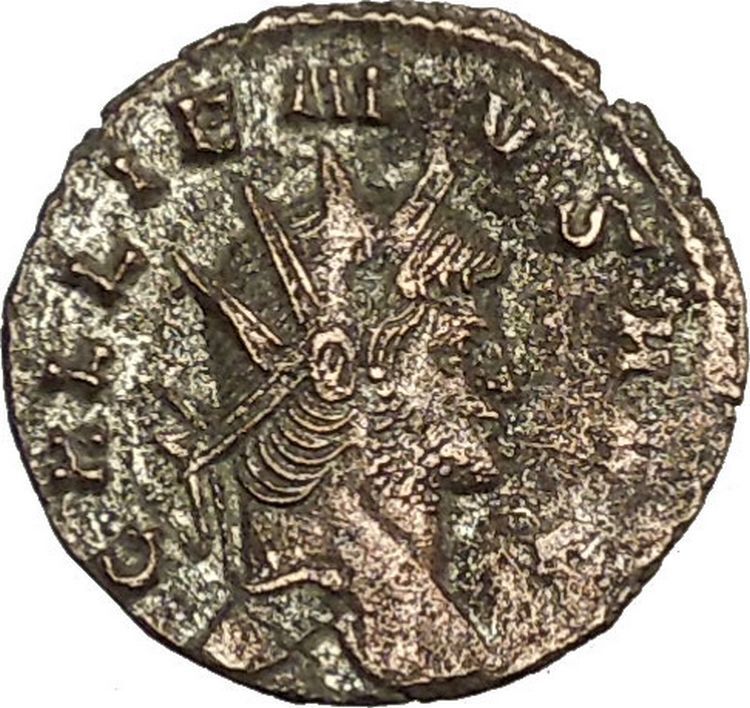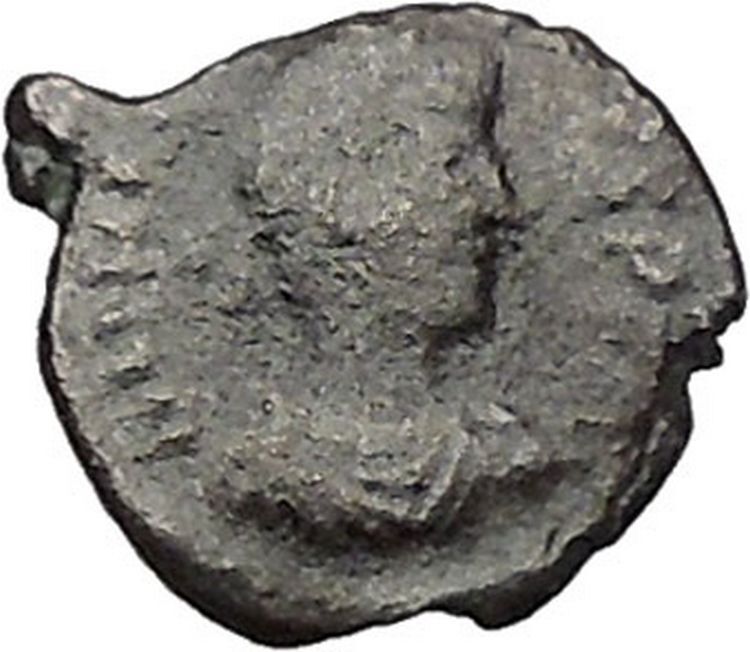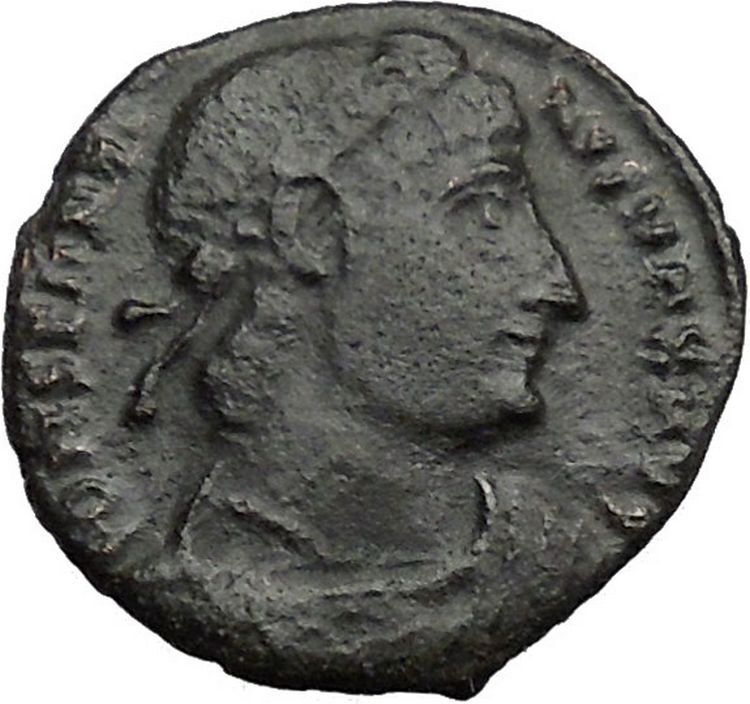|
Faustina I Senior – Roman Empress Wife of Roman Emperor Antoninus Pius
DIVA FAUSTINA
Bronze Sestertius 33mm (22.80 grams) Rome mint, struck under Antoninus Pius circa 146-161 A.D.
Reference: RIC III 1123; Cohen 126
Certification: NGC Ancients F 4285250-009
DIVA FAVSTINA, draped bust right.
AVGVSTA. Cybele, wearing polos, seated left, holding drum in right hand and branch in left arm. SC in exergue.
You are bidding on the exact item pictured, provided with a Certificate of Authenticity and Lifetime Guarantee of Authenticity.
 Cybele (Phrygian: Matar Kubileya/Kubeleya “Kubeleyan Mother”, perhaps “Mountain Mother”; Lydian Kuvava; Greek: Kybele) was an originally Anatolian mother goddess. Little is known of her oldest Anatolian cults, other than her association with mountains, hawks and lions. She may have been Phrygia’s state deity; her Phrygian cult was adopted and adapted by Greek colonists of Asia Minor and spread from there to mainland Greece and its more distant western colonies from around the 6th century BCE. Cybele (Phrygian: Matar Kubileya/Kubeleya “Kubeleyan Mother”, perhaps “Mountain Mother”; Lydian Kuvava; Greek: Kybele) was an originally Anatolian mother goddess. Little is known of her oldest Anatolian cults, other than her association with mountains, hawks and lions. She may have been Phrygia’s state deity; her Phrygian cult was adopted and adapted by Greek colonists of Asia Minor and spread from there to mainland Greece and its more distant western colonies from around the 6th century BCE.
In Greece, Cybele met with a mixed reception. She was partially assimilated to aspects of the Earth-goddess Gaia, her Minoan equivalent Rhea, and the Corn-Mother goddess Demeter. Some city-states, notably Athens, evoked her as a protector, but her most celebrated Greek rites and processions show her as an essentially foreign, exotic mystery-goddess who arrives in a lion-drawn chariot to the accompaniment of wild music, wine, and a disorderly, ecstatic following. Uniquely in Greek religion, she had a transgender or eunuch mendicant priesthood. Many of her Greek cults included rites to a divine Phrygian castrate shepherd-consort Attis, who was probably a Greek invention. In Greece, Cybele is associated with mountains, town and city walls, fertile nature, and wild animals, especially lions.
In Rome, Cybele was known as Magna Mater (“Great Mother”). The Roman State adopted and developed a particular form of her cult, and claimed her conscription as a key religious component in their success against Carthage during the Punic Wars. Roman mythographers reinvented her as a Trojan goddess, and thus an ancestral goddess of the Roman people by way of the Trojan prince Aeneas. With Rome’s eventual hegemony over the Mediterranean world, Romanised forms of Cybele’s cults spread throughout the Roman Empire. The meaning and morality of her cults and priesthoods were topics of debate and dispute in Greek and Roman literature, and remain so in modern scholarship.
Annia Galeria Faustina, more familiarly referred to as Faustina the Elder (Latin: Faustina Major; born September 21 about 100, died October or November 140), was  a Roman Empress and wife of Roman Emperor Antoninus Pius. a Roman Empress and wife of Roman Emperor Antoninus Pius.
Faustina was the only known daughter of consul and prefect Marcus Annius Verus and Rupilia Faustina. Her brothers were consul Marcus Annius Libo and praetor Marcus Annius Verus. Her maternal aunts perhaps were Roman Empress Vibia Sabina, Matidia Minor. Her paternal grandfather had the same name as her father and her maternal grandparents possibly were Salonina Matidia (niece of Roman Emperor Trajan) and suffect consul Lucius Scribonius Libo Rupilius Frugi Bonus. Faustina was born and raised in Rome.
As a private citizen, she married Antoninus Pius between 110 and 115. Faustina and Antoninus had a very happy marriage. Faustina bore Antoninus four children, two sons and two daughters. They were:
-
Marcus Aurelius Fulvius Antoninus (died before 138); his sepulchral inscription has been found at the Mausoleum of Hadrian in Rome.
-
Marcus Galerius Aurelius Antoninus (died before 138); his sepulchral inscription has been found at the Mausoleum of Hadrian in Rome. His name appears on a Greek Imperial coin.
-
Aurelia Fadilla (died in 135); she married Aelius Lamia Silvanus or Syllanus. She appears to have had no children with her husband and her sepulchral inscription has been found in Italy.
-
Annia Galeria Faustina Minor or Faustina the Younger (between 125-130-175), a future Roman Empress; she married her maternal cousin, future Roman Emperor Marcus Aurelius. She was the only child who survived to adulthood.
On July 10, 138, her uncle emperor Hadrian had died and her husband became the new emperor. Antoninus was Hadrian’s adopted son and heir. Faustina became Roman Empress and the senate accorded her the title of Augusta. Faustina as an empress was well respected and this beautiful woman was renowned for her wisdom. The Augustan History impugned her character, criticizing her as having “excessive frankness” and “levity”. However, this doesn’t appear to be the case with her character. Throughout her life, Faustina as a private citizen and an empress was involved in assisting with charities, assisting the poor and sponsoring and assisting in the education of Roman children, particularly of Roman girls.
She can be viewed as one of the most moral, stable and respected empresses in the history of the Roman Empire. When Faustina died, Antoninus was in complete mourning for Faustina.
Antoninus did the following in memory of his loving wife:
-
Deified her as a goddess (her apotheosis was portrayed on an honorary column)
-
Had a temple built in the Roman Forum in her name, with priestesses in the temple.
-
Had various coins with her portrait struck in her honor. These coins were inscribed DIVA FAVSTINA (“Divine Faustina”) and were elaborately decorated.
-
Founded a charity called Puellae Faustinianae or Girls of Faustina, which assisted orphaned girls.
-
Created a new alimenta (see Grain supply to the city of Rome).
In 2008, archaeologists digging at the ancient site of Sagalassos in Turkey discovered a colossal marble head which is believed to be that of Faustina.
|









 Cybele (Phrygian: Matar Kubileya/Kubeleya “Kubeleyan Mother”, perhaps “Mountain Mother”; Lydian Kuvava; Greek: Kybele) was an originally Anatolian mother goddess. Little is known of her oldest Anatolian cults, other than her association with mountains, hawks and lions. She may have been Phrygia’s state deity; her Phrygian cult was adopted and adapted by Greek colonists of Asia Minor and spread from there to mainland Greece and its more distant western colonies from around the 6th century BCE.
Cybele (Phrygian: Matar Kubileya/Kubeleya “Kubeleyan Mother”, perhaps “Mountain Mother”; Lydian Kuvava; Greek: Kybele) was an originally Anatolian mother goddess. Little is known of her oldest Anatolian cults, other than her association with mountains, hawks and lions. She may have been Phrygia’s state deity; her Phrygian cult was adopted and adapted by Greek colonists of Asia Minor and spread from there to mainland Greece and its more distant western colonies from around the 6th century BCE. a Roman Empress and wife of Roman Emperor Antoninus Pius.
a Roman Empress and wife of Roman Emperor Antoninus Pius.




